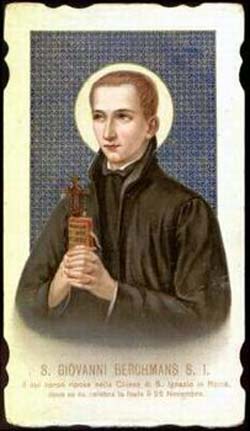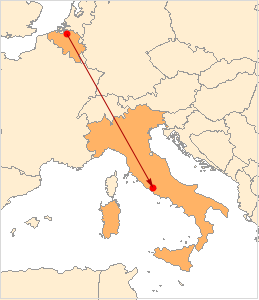
Born: March 13, 1599, Diest, Belgium
Joined the Jesuit Order: September 24, 1616 (aged 17)
Died: August 31, 1621 (aged 22)
Beatified: 1865 (244 years later)
Canonized: 1888 (23 years after that)
Patron Saint: Altar Servers
Feast Day: November 26
John Berchmans (note, the final “s” is part of the name) was born and grew up in a Flemish-speaking area of present-day Belgium. His short life (he was only 22 when he died of a sudden fever) was marked by extraordinary piety, even by the standards of the day, which were much higher than our own.
Ora et Labora
At the age of 7, John would get up at 5 am and serve 2 or 3 Masses, carefully listening to the sermons (in those days every priest had to say his own Mass every day – it was not enough to concelebrate the Mass of another priest.) For this reason, perhaps, John was later made the patron saint of altar servers. At the age of 9, he would spend hours every day with his mother, who was bedridden with a long illness. His parish priest, Fr. Emmerick noticed all this and remarked that Our Lord would “work wonders in the soul of the child.” John was always especially devoted to Mary, our Blessed Lady, and loved the Rosary, which he would often pray whilst walking along.

Not only did John throw himself into religious devotions with great enthusiasm, he would also try to do more than his share of the chores, or try to take the most arduous and difficult ones. Later, in the Jesuit order, he was the novice who tried hardest to fulfill all the rules. After studying for two years in Belgium, taking his first vows and starting philosophy studies in Antwerp, he set out for Rome to continue his Jesuit philosophy training there. Today this is a comfortable 90 minute flight or an arduous 15 hour drive; John did the journey (due to the Alps a road distance of around 1000 miles) on foot! He had a burning ambition to give his all for Christ, and even to become a saint: “If I do not become a saint when I am young,” he said, “I shall never become one.” Perhaps he had a premonition of his early death, or perhaps he realized how creature comforts can paralyse spiritual life in adulthood. Portraits usually depict him holding a crucifix, a rosary and his Jesuit rule-book.
What his life means to us today
The fierce, passionate “muscular” Christianity of John Berchmans seems unreal, even horrifying to many of today’s Catholics brought up on soft-focus posters, self-affirming books and the belief that Christian love means primarily kindness – but let us not be deceived. Jackie Pullinger, who as a young woman preached and lived the gospel in the deadly slums of Hong Kong, famously said that Christians need “soft hearts” but “hard feet.” The seventeenth century was a cruel time all round, with no punches pulled and no anaesthetics. But Catholics like John had the hardest feet imaginable, and besides fortitude (“guts”) and self-sacrifice, they excelled in virtues that the 21st century West ignores or treats almost as a joke, such as humble obedience, temperance, diligence and chastity. Hence St John’s value to us as a guide today lies in his youthful, clear vision in areas where our own times have gaping blind spots.
